You can Download Learning the Game Questions and Answers, Summary, Activity, Notes, Samacheer Kalvi 9th English Book Solutions Guide Pdf Prose Chapter 1 help you to revise complete Tamilnadu State Board New Syllabus and score more marks in your examinations.
Tamilnadu Samacheer Kalvi 9th English Solutions Prose Chapter 1 Learning the Game
Learning the Game Warm Up:
1. Think of what you would like to do in future. Fill in the spaces.

Answer:
2022 – To score 75% marks in the HS Board Examination; 2022-2026 – To complete any chosen Degree course; 2026-2029 – To take up Higher Degrees in the chosen field; 2030-2039 – Into job (professional and personal uplift); 2040 Onwards – To do some social service besides the regular job.
Learning the Game Intext Questions
9th English Guide Question 1.
Who were Sachin’s favourite players?
Answer:
Sunil Gavaskar and the West Indian legend Viv Richards were Sachin’s favourite players.
Learning The Game 9th Standard Question 2.
What was special about Shardashram Vidyamandir in Mumbai?
Answer:
Compared to many other schools in Mumbai, Shardashram Vidyamandir gave due importance to the game of cricket. Mr. Ramakant Achrekar was the cricket coach there and he regularly conducted summer camps.
Learning The Game Question Answer Question 3.
What was the opportunity that transformed the life of Sachin?
Answer:
The opportunity to join Achrekar Sir’s camp involving a session in the morning and evening at Shivaji Park transformed the life of Sachin.
Learning The Game 9th Standard Question Answer Question 4.
What sort of converstions did Ajit and Sachin have while travelling?
Answer:
While travelling in the bus, Ajit would talk to Sachin about the nuances of batting a lot.
9th English Learning The Game Question Answer Question 5.
What routine did Sachin follow in washing his clothes?
Answer:
Sachin had only one set of cricket clothes and the routine was to wash them as soon as he’d return from the morning session. While he had his lunch, the clothes would dry out in the sun and he would wear them again in the afternoon. The pattern was repeated in the evening so that he could use the same set of clothes the following morning.
9th Learning The Game Question Answer Question 6.
What did Achrekar inform Ajit?
Answer:
Achrekar informed Ajit that Sachin had the potential to be a good cricketer if he practiced all year round.
Learning The Game Book Back Answers Question 7.
What was the suggestion given by Achrekar to Sachin’s father?
Answer:
Achrekar suggested that Sachin should change schools if he wanted to pursue cricket seriously, since the New English School in Bandra, where Sachin was studying, did not have cricket facilities.
9th Standard English Learning The Game Pdf Question 8.
What acted as a safety valve?
Answer:
At Shardashram Vidyamandir, where Achrekar Sir was the cricket coach, all his excess energies were getting channeled into cricket, which acted as a kind of safety valve for Sachin.
Learning The Game 9th Standard Pdf Question 9.
What did Sachin do during the thirty-minute break?
Answer:
During the thirty-minute break, Sachin would often have a vadapav, a popular Mumbai fast food, with the money that Achrekar sir would give him.
9th Standard English Guide Question 10.
What is the intense ‘fifteen minutes’ mentioned?
Answer:
Between 5 pm and 7 pm, Sachin would have five more net sessions. Towards the last 15 minutes, Achrekar Sir would place a one rupee coin on top of the stumps and if Sachin managed to avoid getting out, the coin was his. In this session every bowler in the camp would come and bowl to him, with some sixty to seventy boys fielding. It meant he had to hit every ball along the ground to survive and win the one rupee coin. This period was the intense fifteen minutes.
Learning The Game Question 11.
What did Sachin’s father do just to make Sachin happy?
Answer:
Occasionally, Sachin’s father took him home. Sachin would always ask his father to treat him to a special fruit cocktail at a juice centre near the club. Though it was a little unreasonable, his father would give him what he wanted, just to see him happy.
Learning The Game Lesson Question Answer Question 12.
What did embarrass Sachin in the bus?
Answer:
Sometimes Sachin had to travel home from Shivaji Park by bus. In the crowded buses, it was a challenge to stand with his kitbag. The conductors were often rude and would inevitably complain that Sachin was taking the place of two passengers and even asked him to buy ticket for two. As he never had extra money it embarrassed him. His dirty clothes added to the same.
9th English Guide Pdf Question 13.
What made Sachin forget to go to the nets?
Answer:
Occasionally, while playing with his friends at home, Sachin would conveniently forget to go to the nets amidst all the fun.
Learning The Game Sachin Tendulkar Pdf Question 14.
What did Achrekar advise Sachin?
Answer:
Achrekar advised Sachin not to waste his time playing insane games with kids. He would say that Cricket was waiting for him at the nets and that he should practice hard to see what magic can transpire.
Learning the Game Textual Questions
A. Answer the following questions in one or two sentences.
Learning The Game Sachin Tendulkar Question Answer Question 1.
What was coach Achrekar’s first impression on Sachin?
Answer:
Coach Achrekar’s first impression on Sachin was that he was too young to make the camp.
Learning The Game Questions And Answers Question 2.
Why did Sachin feel that the schedule of the camp was ‘rigorous’?
Answer:
Sachin had to practice between 7.30 am and 10.30 am and again he would practice from afternoon to the evening. By the end of the day he would feel exhausted and hence Sachin felt the schedule to be rigorous.
Learning The Game By Sachin Tendulkar Question 3.
What did serve as a very personal cocaching manual to Sachin?
Answer:
Initially, Ajit accompanied Sachin for the practice sessions by bus and he would talk to him about the nuances of batting. The note that Ajit gave Sachin containing some thoughts about batting served as a very personal coaching manual to him.
Learning The Game Summary Question 4.
Why was Sachin asked to change the school?
Answer:
Sachin was asked to change the school because he wanted to pursue cricket as his career.
Samacheer Kalvi 9th English Book Answers Question 5.
What was the condition laid down by Sachin’s father for changing the school?
Answer:
Sachin’s father made Sachin understand that he could change school only if he was serious about playing cricket.
Question 6.
How did the act with the one rupee coin help Sachin become a good cricketer?
Answer:
Winning the one-rupee coin used to give him immense satisfaction and taught him how to concentrate even when physically drained. The drive to get the one rupee for himself surely helped Sachin to survive the last fifteen minutes of his rigorous training and strive hard to survive all the bowlers and sixty to seventy boys who fielded him.
Question 7.
What did help Sachin to build his physical and mental stamina?
Answer:
The final part of the training for a day would be running two full circuits at Shivaji Park with his pads and gloves on. It was a routine he would repeat right through his summer holidays and it helped him to build his physical and mental stamina.
Question 8.
Which incident triggered the coach to be angry on Sachin?
Answer:
Achrekar, the coach was indeed angry on Sachin when he played with his friends at home having fun and not turning up for cricket coaching giving lame excuses.
Question 9.
Why do you think Achrekar punised Sachin?
Answer:
Achrekar knew that Sachin was a promising cricketer the world would one day look at with awe. Therefore, he punished Sachin.
Question 10.
‘I owe myself to him ’ – What does Sachin mean by this?
Answer:
All the fame, popularity, wealth and recognition that Sachin gets today is because of his coach Achrekar. Hence he says, ‘I owe myself to him.’
Additional Questions
Question 1.
How old was Sachin when he started to train under Achrekar?
Answer:
Sachin was eleven when he started to train under Achrekar.
Question 2.
What was the similarity between Sachin and his coach?
Answer:
Achrekar was eleven when he started playing cricket in 1943 and Sachin was also eleven when he went to Achrekar for the first time. ,
Question 3.
Quote a couple of instances from the text that show Sachin’s love for cricket from early childhood.
Answer:
From a very early age, I played tennis-ball cricket with my colony friends. I loved watching cricket on television and, I often tried to emulate the mannerisms of my favourite players. These lines from the text show Sachin’s love for cricket from early childhood.
Question 4.
How did the school Shardashram Vidyamandir differ from other schools in Mumbai?
Answer:
Compared to many other schools in Mumbai, Shardashram Vidyamandir gave importance to the game of cricket. It was all the more different since Achrekar Sir was the cricket coach too.
Question 5.
In which year was Sachin Tendulkar a part of the World Cup-winning team for India?
Answer:
Sachin Tendulkar was a part of the World Cup-winning team for India in 2011.
Question 6.
What was the suggestion given by Ajit to Coach Achrekar that helped Sachin to overcome his nervousness?
Answer:
Ajit suggested that Sir Achrekar, the coach should go away while Sachin was batting and then watch him from a distance since he was confident of his brother’s talent.
Question 7.
“The system worked well – apart from my pockets.” What is the ‘system’ referred to here by Sachin?
Answer:
Sachin had only one set of cricket clothes. So he had to wash them as soon as he returned from the morning session. He repeated the same process in the evening so that he could use the same set of clothes the next day. This was the ‘system’ referred to here.
Question 8.
This regular demand was “a little unreasonable.” What was the unreasonable demand? Why?
Answer:
Sachin would ask his father to treat him with a special fruit cocktail. He did not realize that his parents also had to take care of the needs of his brothers and sisters. Hence this was an unreasonable demand.
Question 9.
Why was Sachin asked by the bus conductor to buy two tickets?
Answer:
When Sachin had to stand in the bus with his kitbag, the conductors would complain about his , kitbag taking up the space of another passenger. So they would ask him to buy two tickets.
Question 10.
What would Achrekar do if Sachin did not turn up for coaching?
Answer:
If Sachin did not turn up for coaching, Achrekar would jump on his scooter to find him having fun with his friends at home. He would drag him out of the house and together head towards Shivaji Park to pursue practice. .
B. Answer the following in a paragraph of 120 – 150 words:
1. ‘Achrekar was a sincere coach’. Substantiate.
Answer:
Ramakant Achrekar started playing Cricket in the year 1943 when he was eleven. His most famous student is undoubtedly Sachin Ramesh Tendulkar, India’s Highest run scorer in both Tests and ODIs and also the current record holder for multiple records! He has been instrumental in grooming some of the country’s most renowned cricketers like Vinod Kambli, Ajit Agarkar and Romesh Powar.
Achrekar coached young cricketers at Shivaji Park, Dadar in Mumbai. Sachin trained under him when he too was just eleven, while he was a student at the New English School, Mumbai. Later Sachin was asked to change to Shardashram Vidyamandir, Mumbai where he coached. When he was young, Tendulkar would practice for hours and hours in the nets. If he became exhausted, Achrekar would put a one-rupee-coin on the top of the stumps, and the bowler who dismissed Tendulkar would get the coin.
If Tendulkar passed the whole session without getting dismissed, the coach would give him the coin. Such a motivational reward from the coach made Tendulkar strive and survive to win the coin. Tendulkar recalled an incident when his coach told him to play for ‘B’ team of his School. Instead of batting, he preferred sitting in the gallery and cheering for his schoolmates. In the evening, when he came across Achrekar, he was asked how many runs he had scored. Taken aback, Tendulkar told him that he was clapping and cheering up. Then came a slap which shattered his myth. He realized what a mistake he had committed. Achrekar told him firmly that he was not born to just clap for others but for others to watch him and clap for him.
Question 2.
Narrate in your own words the hardships underwent by Sachin to become a great cricketer.
Answer:
Ajit, one day, took his brother Sachin to the Achrekar Sir’s camp to get trained. Sachin was nervous and failed miserably in front of him. Ajit asked the coach to give him another chance and observe him unawares. This time, Sir agreed to let him join the camp. The camp involved a session every morning and evening at Shivaji Park. He would practice between 7.30 a.m. and 10.30 a.m. in the morning. Then he would come back in the afternoon and practice till late evening. The schedule was rigorous and he would be exhausted by the end of the day. Travelling to Shivaji Park took forty minutes from his house in Bandra and he had to catch an early morning bus to make it on time.
As a child, he had only one set of cricket clothes and the routine was to wash them as soon as he returned to wear it for the next session. By the middle of the summer camp, Sir had started taking an active interest in his batting and at the end of the two months, informed Ajit that he had the potential to be a good cricketer if he practiced all year round. In his first year at Shardashram, he played fifty five practice matches during the summer break of sixty days. His summer sessions used to start at 7.30 am and end at 4.30 pm.
His evening session would start at 5 pm after a thirty-minute break. Between 5 pm and 7 pm he would have five more net sessions. Towards the last 15 minutes, every bowler in the camp would come and bowl to him, with some sixty to seventy boys fielding. At the end of it all., Sir would tell hi to run two full circuits of Shivaji Park with his pads and gloves on. That was the last part of his training and he would be completely exhausted by the end of it all. It was a routine he would repeat right through his summer holidays.
Question 3.
Quote the sentences which you find most inspiring from ‘Learning the Game’. How do they inspire you? Explain.
Answer:
Sachin Ramesh Tendulkar, the world famous cricketer has set many records in his career and is considered as one of the greatest Batsman of all times. ‘I often tried to emulate the mannerisms of my favorite players, Sunil Gavaskar and the West Indian legend Viv Richards.’ – This is one of the inspiring sentences to me.
If Sachin can emulate and have a role model, how important it is for me to find my role model to pursue my career, ‘Winning the one-rupee coin used to give me immense satisfaction and taught me how to concentrate even when physically drained. ’ – Rewards are surely a big motivational factor. Hence, it is quite important that we fix a target and strive hard even during dire circumstances that we should be focused to achieve in life.
‘I didn’t have the money for a second ticket and I had to learn to take these remarks in my stride. ’ – Life is full of ups and downs. We should never yield to any kind of pressure and give up easily. Life is a mixture of success and failure and the road to success is never a bed of roses. We should be ready to tread on a rough path with many pitfalls. However, we need to be determined and perseverant in our journey. Above all the words from the coach is the most inspiring. It penetrates into your heart to know the purpose of your life. It pierces your heart and makes you be focused and chase your dream. ‘Cricket is waiting for you at the nets. Practice hard and see what magic can transpire.’
Additional Questions:
Question 1.
The child in Sachin is indeed clear in the lesson, ‘Learning the Game’ – Substantiate.
answer:
The nervousness in a child is vivid in Sachin. He has never batted in the nets and feels somewhat overawed with so many people around him when Aj it takes him to be trained under Achrekar Sir. When he is asked to bat, he is not at all comfortable since he is very childish and not career oriented. With Sir watching him so closely, he fails to make an impact in his future coach. His nervousness takes a sixer, with his coach pretending to be engaged with other things and manages to impress Achrekar sir.
Even though Sachin loved cricket, there were occasions when playing with his friends at home was more fun for him than going for practice. He would conveniently forget going to the nets. He would be engrossed in a melee with his friends. Just as a kid would give excuses, he too would give umpteen number of lame excuses. He would sometimes bunk his daily evening practice to just watch an inter-school cricket match not realizing that he needs to practice for the whole world to watch him play
Vocabulary:
C. Match the words in column A with their synonym in column B.
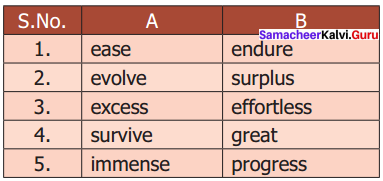
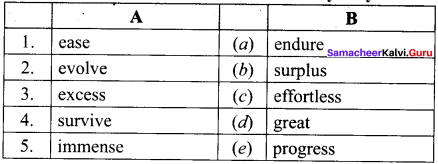
Answers:
- (c)
- (e)
- (b)
- (a)
- (d)
D. Match the words in column A with their antonym in column B.
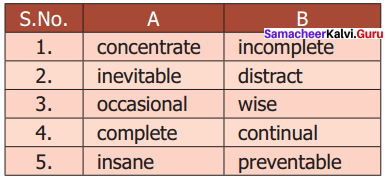
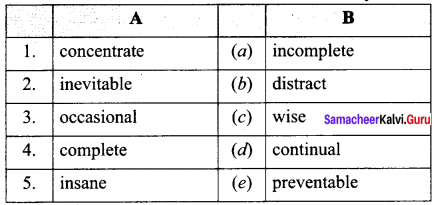
E. Homonyms
Homonyms are words with similar sound and spelling, but with a different meaning.
Use the words given below in your own sentences so as to get different meanings. One is done for you.
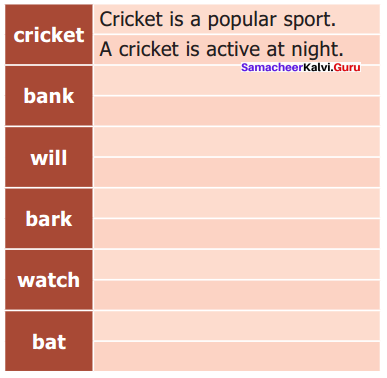
Answer:
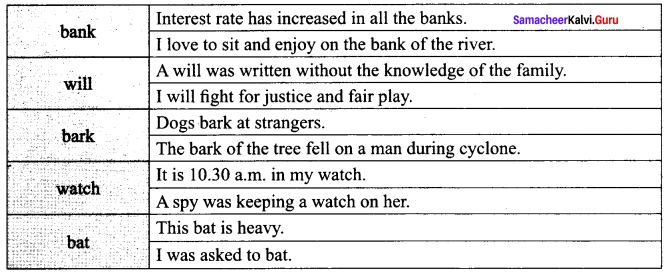
F. Homophones
Homophones are words with similar sound but different spelling and meaning.
Consult a dictionary, to find the homophones for the given words.
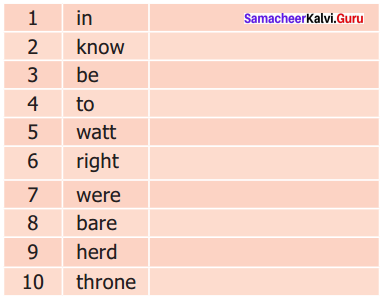
Answers:
- inn
- no
- bee
- two
- what
- write
- where
- bear
- heard
- thrown
G. Prefix and Suffix
Prefixes are added to the beginning of a root word while suffixes are added to the end.
Look at the prefixes given and frame two new words for each prefix and suffix. One is done for you.
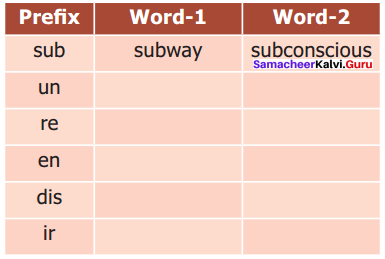
Answers:
2. untold, unwise
3. reunion, rewind
4. enrol, enroute
5. disorganised, disoriented
6. irregular, irresponsible
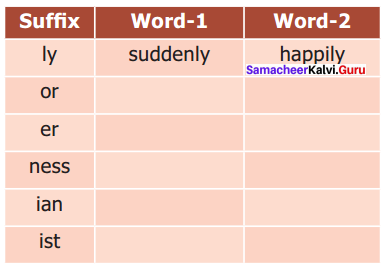
Answers:
2. distributor, accelerator
3. typewriter, malpractitioner
4. kindness, unpleasantness
5. electrician, academician
6. economist, nutritionist
Listening:
H. Listen to the passage on Paralympics and choose the correct answer.
(For listening to the passage refer to our website www.fullcircleeducation.in) The Olympic Games began in Greece about three thousand years ago. All wars stopped for the Olympics in those days. The discus and the Pentathlon began in these early Olympic Games. In 394 the Romans stopped the Greek Olympic Games, because they didn’t like them. In 1896, Frenchman – Pierre de Coubertin began the Olympic Games again. These days the Olympic Games usually happen every four years.
But how did the Paralympics for disabled begin? In the 1940s Sir Ludwig Guttmann was a doctor at the Stoke Mandeville hospital in England. At the hospital there were many disabled soldiers from World War II and Guttmann wanted these soldiers to get better by doing sports. The Paralympics are younger than the Olympics, but they are getting bigger all the time. The first true Paralympic Games happened in Rome in 1960.
Four hundred disabled athletes from twenty-three different countries came to these Games. At the Beijing Paralympics in 2008, there were 4,000 disabled athletes from 144 countries! These days there are Paralympic Games every four years, and because it’s easier for Paralympic athletes to stay in Olympic hotels and to run in Olympic stadiums, the Paralympics usually happen in the Olympic cities, too. Think of swimming with only one leg against people with two legs. Think of running with artificial legs. Think of playing basketball in a wheelchair. Disabled people can do some wonderful things!
1. The Paralympic games are for ……………….. .
(a) children
(b) disabled people
(c) women
Answer:
(b) disabled people
2. The Paralympic games usually happen ………………… .
(a) in Greece
(b) every four years
(c) after the Olympic Games
Answer:
(c) after the Olympic Games
3. The first true Paralympic Games happened in Rome in ……………… .
(a) 1960
(b) 1952
(c) 1848
Answer:
(a) 1960
4. In 394 BCE, the ………………. stopped the Greek Olympic Games, because they didn’t like them.
(a) Romans
(b) Greeks
(c) British
Answer:
(a) Romans
5. ……………… was a doctor at the Stoke Mandeville hospital in England.
(a) Pierre de Coubertin
(b) Sir Ludwig Guttmann
(c) Natalie du Toit
Answer:
(b) Sir Ludwig Guttmann
Speaking:
I. Given below are five main qualities for true sportsmanship.
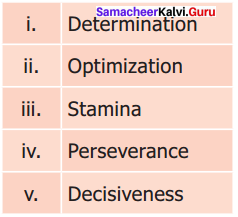
Get into groups of four. Each group will choose one quality to talk about to the whole class for about one minute. But before you talk, you have two minutes to think about it. You can make notes if you wish.
Group A: Determination
It is said that desire is the key to motivation, but it is determination and commitment to an unrelenting pursuit, a commitment to excellence, that will help in attaining the success. Being determined gives strength to push. Even when you don’t want to, just knowing you should will give you that extra bump in right direction.
All great achievers in life have made it where they are today due to their hard work, commitment and determination. Everything is work in progress at some point and with the strength of determination it becomes an achievement in time. Prioritizing your life helps you keep your goals in check and likewise makes them easier to accomplish.
Michael Jordon’s high school basketball coach refused to take him in the team. Jordan did not agree or accept what his coach said. Everyday after school he practiced and practiced and practiced. He did not give up until he sunk one thousand successful shots. His determination drove him to achieve ultimate success in life. With the help of a good set of priorities to overcome and conquer the reflection he faced, when his coach told him he was not good enough, he succeeded over all.
Group B: Optimization
Optimization is the process of adjusting a trading system in an attempt to make it effective. Some people think that the best kind of life is one that is filled with family. Some may think that it is concerning living life without any regrets and being prosperous, healthy and having someone to share it all with.
Making choices can affect any and everything in life. According to George Terry, “Decision making is the selection based on some criteria from two or more possible alternatives.” It is . part of problem solving. Optimization is making the maximum use or benefit of that right decision taken. Schooling is imperative in ones early period of life. Where to study has always been a choice that parents take for giving quality education. To tap the maximum, the parent try to optimize the sources available.
No one in this world wants less. Everything must be perfect. From the household machines to stationeries, tools, equipment, furniture, house, etc., its output must be maximum.
True optimization is the revolutionary contribution of modem research to decision processes.
Group C: Stamina
“Champions aren’t made in gyms. Champions are made from something they have deep inside them – a desire, a dream, a vision. They have to have last-minute stamina, they have to be a little faster, they have to have the skill and the will. But the will must be stronger than the skill.” – Muhammad Ali.
Stamina not only refers to physical strength but mental strength too -the grit. It is the ability to sustain over time, to call from ourselves renewed commitment and effort when we are confronted with challenges or hardship. Stamina helps in tolerating discomfort and reach for resources we are not certain we possess. Stamina means that we remain steadfast even through criticism, monotony, and discouraging odds.
When a person is able to accomplish or withstand a higher amount of effort than their original capabilities, their endurance is increasing which to many personnel indicates progress in looking to improve ones stamina. If higher repetitions are taken rapidly muscle strength improves. A gain in stamina decreases anxiety, depression and stress. Stamina is the ability of a force to sustain high levels of combat potential relative to its opponent. Thus stamina refers to keep going through a tough situation involving hardship, stress, etc.
Group D: Perseverance
A patient person with strong determination can achieve his goal by perseverance. Perseverance is the secret of success. Without it, no great achievement is possible. Every action has its reaction. So hard labour has no alternative. It must yield results. “Rome was not built in a day;” likewise monuments, palaces, forts, etc., were built only by long and hard labour. It is through perseverance of thousands of diligent men that such magnificent structures can be erected.
Perseverance means the constant or persistent dedication of efforts, time and mind in doing some activity irrespective of difficulties and delays in achieving the ultimate goal or success. In the ecosystem, survival of fittest also relates to the perseverance mechanism. Success need not always be in the bags of intelligent people. There are some intelligent people who are reluctant and lethargic; so they don’t use their ideas, skills or even labour in the right way. On the other hand, one who is determined, focused and does not give up by facing failures achieves the final goal. “Great works are performed not by strength but by perseverance.”
Group E: Decisiveness
The core quality of a leader is decisiveness. When decisions need to be made effective leaders gather facts, analyse the situation, consider alternatives and decide the best course of action. Decisiveness is a great quality that does not allow you to procrastinate or stand around wringing the hands. They move on. Decisive leaders understand that their decisions may not be perfect and therefore modifications . may be needed. They don’t hesitate to modify or alter their decisions. Making good decision is too important to be left to chance. Emotions have a huge influence over the quality of decision making, preventing from making sound judgements.
Decisiveness is the willingness to make decisions, even in the face of complexity or uncertainty. When we are decisive, we weigh the information that is available to us and we use our judgement to choose among the possibilities. It is easier to be decisive when we are clear about our values and goals. Perfect clarity will never be available and indecision can be costly. So taking decision and going ahead in the plan is important. Decisiveness is dare to do with right motive, which is an essential quality every person must acquire.
J. Prepare a speech in about 80-100 words for the morning assembly, stressing on the importance of games and sports in ensuring a healthy body and mind.
Life is a game and the world is a playground. We have to play the game of life with all our energy and courage. Games and sports help us to learn how to overcome the challenges of life. A sound mind lives only in a sound body. Sports and games are useful for the students who must have a balanced development of the body as well as the mind.
Education is incomplete without games. Games are necessary to keep the body fit and trim. Moreover, they provide recreation. Students feel happier in a playground than in a classroom. Games also teach us that we should play a game for game’s sake, not for victory or defeat. Games and sports also produce a sense of equality, co-operation and fraternity.
Writing:
K. Your friend who lives in another town/city has won his/her championship trophy in the recent sports meet. Write a letter congratulating him/her.
27 May 2019 Chennai
Dear Ancy,
Congratulations on winning the Championship Trophy in the sports meet held in Gachibowli Athletic Stadium in Hyderabad. We knew you will rock. You are bom to win. I heard you received gold medals in 100 m and 200 m dash, a silver medal in 4 x 100 m relay, and another silver in 100 m hurdles. That’s great. You have got such medals here in our school. Even in the State meet you have kept up your standard. Very good! Hats off to you!!! We are waiting here to hear from you the experience that you underwent and who was your tough competitor. Awaiting eagerly to listen from you. I hope you will be back soon. Bye.
Yours friendly
Kanmani
Address on the envelope:
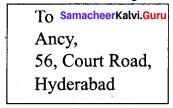
L. Collect information from newspapers, magazines, periodicals and books about any two famous sportswomen. Prepare their profiles. Use the following format:
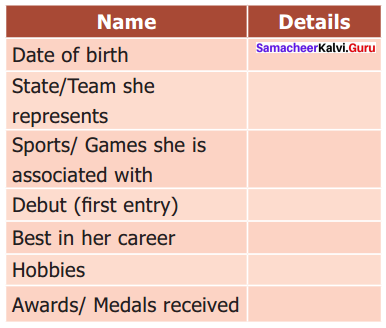
Answer:
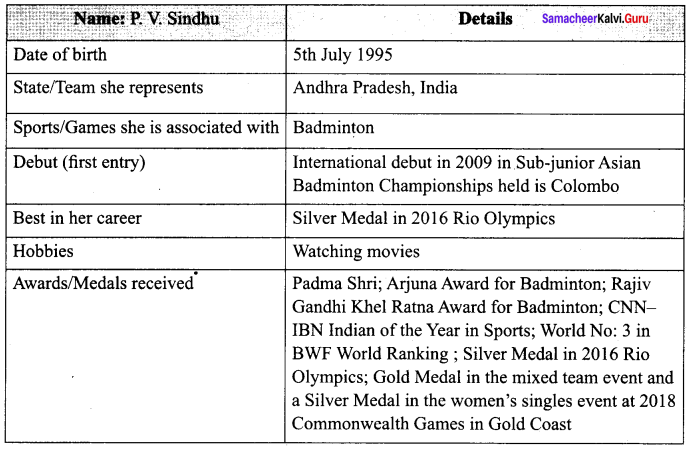
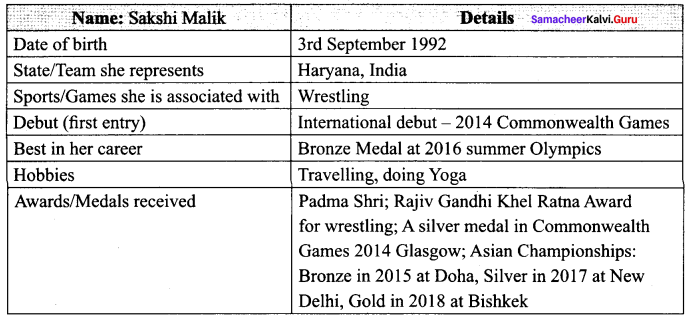
Creative Writing:
M. Write a newspaper article in about 100 words, comparing the achievements of the two sportswomen based on the information you have already collected.
Two Sports Women
Sakshi Malik, an Indian wrestler from Haryana was bom on 3rd September 1992. P.V. Sindhu the Indian Badminton player was bom on 5 th July 1995. Both of them have given their presence in International Debut in the year 2009 and 2014 respectively. Both of them participated and won medals in 2016 Rio Olympics, after which they were awarded Padma Shri, the fourth highest civilian award in India. They hold innumerable records both National and International. . Sakshi has been incredible as she comes from a land where they kill daughters in the womb itself. From such a setting, she came up taking a masculine sport, broke all odds and finally made the country proud. From Sindhu the country can learn the importance of being a good student of the game, and also about what you can do when you have the best coaches around.
Reading:
N. Answer the following questions briefly.
Question 1.
What do Tamil Nadu folk dances and folk arts represent?
Answer:
Tamil Nadu is deeply rooted in a great tradition of folk arts and crafts, which display the customs and skills that have come down from generations. The folk music and dances of Tamil Nadu represent the ethos, aesthetics, values and melody of the region.
Question 2.
When are folk dances and folk music usually performed?
Answer:
Traditionally, folk dances and music are performed during festivals and community functions.
Question 3.
How is Karagattam performed?
Answer:
Karagattam is a popular folk dance of Tamil Nadu, which involves balancing a pot on the head to musical accompaniment. The Karagam pots are decorated with a cone of flower arrangements, topped by a paper parrot. The parrot swings as the dancer swings along.
Question 4.
How were offerings carried during the ancient period?
Answer:
Kavadi Aattam is one of the predominant folk dances of Tamil Nadu. A Kavadi is made of bamboo strips and a light pole. When the ancient Tamils went on pilgrimages, they used to carry offerings tied on either end of a long stick, balanced on their shoulders. To lessen the boredom of the long travel, they sang and danced in praise of God. Kavadi Aattam traces its origin to this practice. This led to the composition of special songs for carrying the Kavadi.
Question 5.
Bring out a few differences between the two art forms Therukoothu and Bommalattam.
Answer:
Bommalattam or Puppetry is held in rural areas of Tamil Nadu during festivals and fairs. Skilled puppeteers manipulate the puppets with strings or wires. They stand behind a screen and the puppets are held in front. The puppetry depicts stories mainly from the Puranas, epics and folklore. Even during Indian freedom struggle, the awareness programmes for the common people were conducted through puppet shows to instill patriotism among the people. Therukoothu is usually conducted during village festivals in the months of Aadi and Panguni. In this dance form, make-up and costumes are considered very important. It is performed on the streets and in open air. The performance involves storytelling, songs, dance and dialogue rendering.
Anagrams:
O. An anagram is a word or a phrase formed by rearranging the letters of a different word or phrase, typically using all the original letters exactly once.
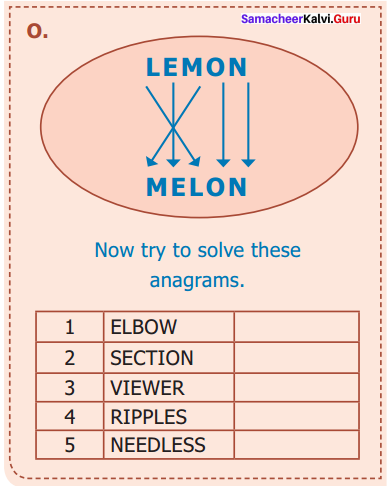
Answers:
- Bowel
- Notices
- Review
- Slipper
- Lessened
P. Work with a partner
Pick out two words from the article on folk culture and folklore of Tamil Nadu with which you can form anagrams. Take turns and ask your partner to solve the anagram and come out with the right words.

Answers:
- Spice
- Dame
- Stop
- Raw
- Aspire
- From
- Bedroom
- Shore
- Once
- Raptor
A Talk Show:
Q. Work in groups of 4-6. Choose one folk art form, that is rarely or no longer performed.
Find out the reasons for this and suggest practical solutions/steps that can be taken to prevent this. After discussion and research, conduct a talk show in the class on the topic FOLK ARTS -AREVIVAL. The following inputs will help you.
Each group will consist of the following members.
1. The host
2. A folk artist
3. A representative from an NGO engaged in reviving some of the dying folk arts
4. A student
5. A citizen from the city
NOTE: Your teacher will distribute role cards with cues to each member of the group to help . you play your roles.
A suggestive article is given here. Students can arrange the Talk Show under the guidance of their teacher.
Dhokhra Handicraft:
Dhokra handicraft is a wax casting technique which has been in India for more than 4,000 years. One of the earliest known artifacts is the ‘Dancing Girl’ of Mohenjo-daro. In modem times, this rare art form is the speciality of the Bastar region, a district in Chhattisgarh. The native tribes of the region are practicing the art and their products are in great demand in domestic and foreign markets because of primitive simplicity, enchanting folk motifs and forceful form. However, the art is dying and no one has been able to come up with a technology to save it.
Grammar:
A. Choose the most appropriate preposition from the brackets.
- We have been living in Chennai ……………. eight years, (for / since)
- Abdul has taken his ……………… father, (after / at)
- Vimal generally goes to his workplace ………….. bus. (by / on)
- The cricket ball was hidden …………. the leaves, (among / between)
- Mani divided his toys ………………. his brothers and sisters, (among / between)
Answers :
- for
- after
- by
- among
- among
B. Identify the prepositions in the given sentences and underline them.
- Riya borrowed a dress from me and lent it to her friend, Mary.
- When I moved back to the city, things had changed considerably.
- The burglar found the keys under the pot in the balcony.
- Prabhu was hiding behind the door when his sister came looking for him.
- My dog sat on my hat and squashed it.
Answers:
- Riya borrowed a dress from me and lent it to her friend, Mary.
- When I moved back to the city, things had changed considerably.
- The burglar found the keys under the pot m the balcony.
- Prabhu was hiding behind the door when his sister came looking for him.
- My dog sat on my hat and squashed it.
C. Complete the passage by filling in appropriate prepositions from the list- (with, out, to, in, from, during, of, for, by). Some prepositions may be used more than once.
In Tamil Nadu, a very interesting form of recitation named Villupattu developed (a) …………… the 15th century. Villupattu means bow-song because a bow-shaped musical instrument (b) ……………….. strong high tension string is used (c) ……………… placing it (d) …………….. an earthen pitcher. It is believed that this narrative form was an invention (e) ……………….. Arasa Pulavar. The troupe gives its performance mostly (f) ……………….. temple festivals. There are seven to eight persons in a troupe who form a kind (g) ………………… chorus that supports the main singer-narrator. When the chief narrator sings, the chorus takes (h) ……………… the refrain (i) ………………. the song and repeats it in unison. The whole party sits (j) ………………… the ground and performs (k) ……………… a lot (l) ……………. gesticulation and facial expression to suit the narrative they have taken. The ballad style songs are composed (m) …………………… the rural dialect which appeals (n) ………………… the audience who sometimes join the troupe (o) …………….. suitable notes or words.
Answers
(a) during (b) with (c) for (d) in (e) by (f) during (g) of (h) out (i) from (j) on (k) with (l) of (m) in (n) to (o) with
D. Frame sentences using the prepositional phrases given in the box.
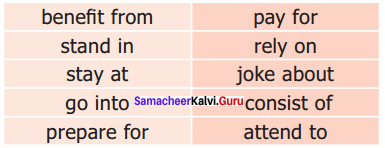

- Students can benefit from knowing the basic parts of a sentence.
- When Ram was away from home, his brother had to stand in his place to take over all his responsibilities.
- An overnight stay at a luxury hotel was a cherished experience for Naanika.
- My daughter has decided to go into freelance computer programming.
- Santosh prepared for the NEET exam as his ambition was to become doctor.
- Teachers make students pay for their mistakes.
- Don’t rely on local weather reports.
- Students like to joke about their friends.
- A crew consisting of ten members was appointed for rescuing the victims.
- A nurse is attending to him after surgery.
E. Given below is a picture of a carnival. Complete the factual description by filling in the blanks with appropriate prepositions.
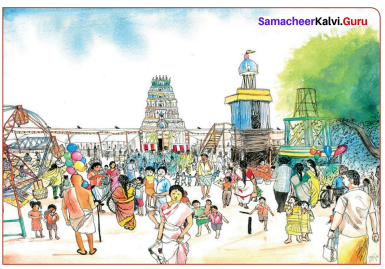
a festive look, as the open spaces are cleaned, spruced up and decorated (a) ……………. colourful streamers. People throng the premises (b) ……………… catch a glimpse (c) …………….. their village deity (d) ………………. a magnificently decorated chariot, and pay their respects. There is a big crowd (e) …………….. the food stalls that serve free piping hot sakkaraipongal (sweet pongal), lemon rice and curd rice. People (f) ………………. nearby villages and towns display their wares attractively, and call out loudly (g) ……………….. the people (h) ……………….. buy their wares. Cotton candy, cut raw mangoes smothered (i) ……………. salt and chilly powder, boiled groundnuts, murukku, sweets, buttermilk, etc., are sold. Men, women, grandmas, grandpas and little children dressed (j) …………………… their best clothes, enjoy the Thiruvizha greatly. You can hear the shrieks (k) ……………… happy children enjoying the rides on ferris wheels and carousels, elders looking (l) ……………………. each other with smiles on their faces. The entire day is spent (m) …………… fun and gaiety. All the village people irrespective of their age, look forward (n) ………………. the thiruvizha every year.
Answers
(a) with (b) to (c) of (d) in (e) near (f) from (g) to (h) to (i) with (j) up in (k) of (l) at (m) with (n) to
Writing:
You stayed with your grandparents at your native village during Pongal. You had an unforgettable time with them. You visited the village fair and enjoyed the simple pleasures of life like bathing in the river, strolling in the fields, eating food cooked in earthen utensils over firewood, sleeping on a cot on the terrace under the star-lit sky, visiting temple fairs and watching Karagattam presentation.
F. Write a letter to your friend, describing the joy of celebrating festivals in a village, with the inputs given above.
21 Jan 2019 Chennai
Dear Manju,
Hope you celebrated the Pongal festival with great joy. I went to my village for the festival holidays this time. It was the most joyous and memorable period of my life. I shall never forget this. You live in city and for you a festival means a holiday and you can wake up late. Then eat all the delicacies prepared by your mum and go for a new released movie or watch television at home. Here in village, they gather in a common place and celebrate. All of them rise early and actively participate in the rituals. All the ladies make pongal and offer it to Sun God as a
mark of thanksgiving. On the third day of festival, we went to fair and played on giant wheel and merry-go-round. We ate lots of fresh made native delicacies like raw mango with chilli powder and salt, palmyra sprout, vada of different varieties, appam, etc. Then we watched the dancers performing folk dances. We also went to the river, to swim and then bathe in the water. Since I didn’t know swimming, I just took a bath. Time was spent observing and being with nature. It was full of fun! The joy of celebrating festivals in a village is truly unforgettable.
Yours friendly, Deepa
Address on the envelope:
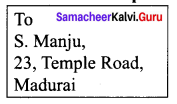
Project:
G. Your class has to stage a Puppet Show in the Assembly Open Forum on the topic ‘Child Labour’. Divide yourselves into groups and discuss the requirements for the presentation like storyline, characters, dialogues, choice of puppets and music for the interlude: Now complete the dialogues given below.
Ramesh : Let us, present a Puppet Show on CHILD LABOUR for our Assembly Open Forum.
Mohammed : That is a very good idea! Let us start planning right away.
Geetha : (1) ……………………………………………………………………………. ?
Leema : I suggest we begin with the storyline first.
Mani : How (2) ………………………………………………………………..?
Ramesh : We can have around five characters.
Mohammed : What (3) ………………………………………………………… ?
Meena : We can focus on the problems of poverty and illiteracy as the major reasons for child labour.
Ramesh : Can (4) …………………………………………………………………… ?
Leema : I am good at making stick puppets. I will make them myself. But I require some help.
Mani : I (5) ………………………………………………………. Tell me, (6) ……………………………………………. .
Leema : Thank you, Mani. Let us stay back after the meeting and discuss.
Ramesh : Have (7) ………………………………………………………………………………… ?
Meena : I think we should have some music for the interlude.
Geetha : That would make it really interesting. I will get my music group to start working on the tunes for our puppet show.
Answers
- We need to discuss about storyline, characters, dialogues, choice of puppets and music for the interlude.
- How many characters do we need then?
- What is the ideal topic for puppet show of ours?
- Can I explore the market for buying some good stick puppets?
- I can help out.
- Tell me, how and when to begin.
- Have we arranged some musical instruments for background music?
Learning the Game by Sachin Ramesh Tendulkar About The Author:
Sachin Ramesh Tendulkar (bom 24 April 1973) is a former Indian international cricketer, acknowledged worldwide as one of the greatest batsmen of all time. A prodigy, Tendulkar took up cricket at the age of eleven. He made his Test debut at the age of sixteen, and went on to captain the Indian national team. Popularly known as the Master Blaster, he is the first batsman to score a double century in a One Day International. Indian cricket followers often call him the God of Cricket. He was a part of the Indian team that won the 2011 World Cup, his first win in six World Cup appearances for India. In 2012, Tendulkar was nominated to the Rajya Sabha. He retired from cricket on 16 November 2013. ‘Learning the Game’ is an extract from his autobiography Playing it My Way.
Learning the Game Summary:
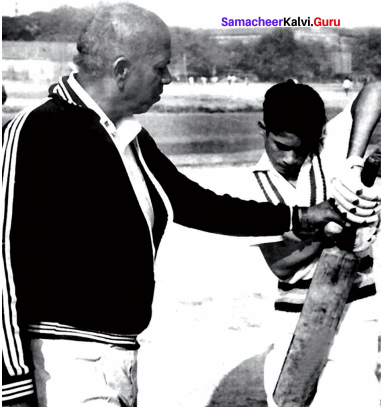
This prose is a tribute by the maestro of cricket, Sachin Tendulkar, to his coach Ramakant Achrekar. It was Achrekar who moulded Sachin towards a proper career in the field of his interest. Sachin’s elder brother Ajit was instrumental in helping him evolve as a great cricketer. Right from his childhood, Sachin tried to copy the batting and bowling styles of his favourite cricketers. He was studying in the New English School, Mumbai. When Sachin was 11, Ajit introduced him to the famous cricketer Ramakant Achrekar, who was coach at the Shardashram Vidyamandir High School.
In the first meeting, the young Sachin could not impress Achrekar. Ajit realised that Sachin , was not able to display his natural gameunder the pressure of being observed. tlponihe insistence of Ajit, Achrekar gave Sachin another chance at playing. This time, Achrekar watched while hiding behind a tree. Sachin played much better and was accented at Achrekar’scamp.
The training was rigorous as it involved sessions every morning and evening at Shivaji Park. In between the sessions, Sachin would attend his school. He had only one set of cricket clothes, which he washed after each session to wear for the next But the clothes would hardly dry and he had to play with wet pockets always. Sachin had a potential to be a good cricketer but his school did not have cricket facilities. Upon Achrekar’s advice, Sachin joined Shardashram Vidyamandir, which had produced many notable cricketers.
In the first year at Shardashram, Sachin played fifty-five practice matches during the summer break of sixty days. Every day, towards the last 15 minutes of the net sessions, Achrekar would place a one rupee coin on top of the stumps. Sachin would get . the coin if he managed to avoid getting out. Winning die coin taught him how to concentrate even when extremely tired. The routine helped him build up physical and mental stamina.
Travelling back home was another challenge. On some days, when his father came to pick him, he demanded for special fruit cocktail and his loving father would oblige. On other days, if he managed to get a seat in the bus, he would fall asleep. If not, he would just stand with the kitbag. The rude conductors would sometimes ask him to buy two tickets, complaining that he took up the space of another passenger. To avoid further embarrassment, Sachin would hide his dirty clothes by wrapping the kitbag around him.
There were times when Sachin missed the camp to play with his friends. Achrekar would find him out and drag him to practice, refusing to listen to his excuses. At that time, Sachin hated being dragged off, but later he felt sheepish about his actions and admired Achrekar’s farsightedness. Had it not been for Achrekar, Sachin would not be the cricketer he turned out to be.
Learning the Game Glossary:
Textual:
bunked – to make one self absent from a class or session.
cocktail – a mixed frink which is a combination of ongredients such as fruit juice, lemonade, flavored syrup or cream.
deteriorated – became worse
emulate – to match or surpass typically by imitation.
embarrassment – a feeling of self – conscious, shame or awkwardness
farsightedness – showing a prudent awamess of future possibilities
induction – the action or process of including someone to an organization
influence – the capacity to have an effect on the character development
kitbag – a long cylindrical canvas bag, (here) used to carry cricket access
melee – a confused crowd of people
nuances – subtle changes in or shades of meaning, expression, or sound
overawed – impressed so much that they are silent or inhibited
passion – strong desire
peer – person of same age, status or ability
pursue – follow or chase
rigorous – extremely thorough and careful
stamina – the ability to sustain or prolonged physical and mental effort
stride – a step or stage in progress towards an aim
transpire – come to be known, revealed
ultimately – being the best or most extreme example
Additional:
anticipating – expecting
inevitably – in an essential manner
occasionally – at times
potential – the inherent capacity of a person
sheepish – showing a sense of shame
Synonyms:
bunked – escaped
pretend – make-believe
channelled – transmitted
rigorous – strict
impact – affect
suggested – advised
invariably – constantly
scrutinizing – inspecting
nervous – anxious
unreasonable – excessive
Antonyms:
accept × reject
exhausted × unexhausted
asleep × awake
forget × remember
conveniently × inconveniently
insane × sane
difficult × easy
rude × polite
embarrassment × disembarrassment, relief
waste × conserve